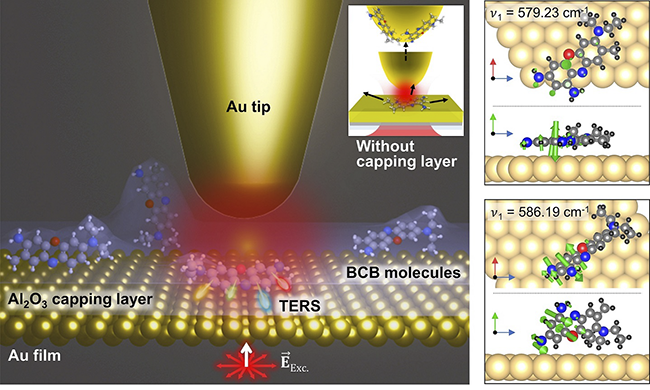Reviewed by Mila PereraSep 16 2022
Chemists’ long-held desire to watch a single molecule’s structural dynamics is finally a reality. Under normal circumstances, single molecules with a diameter of around 1 nanometer (nm, 1 billionth of a meter) exist in a volatile state.
 Illustration of isolated molecules trapped between gold and aluminum oxide layers using a tip-enhanced nanoscopy. (Right) Visualization of the vibration modes of a brilliant cresyl blue (BCB) molecule with different conformations. Image Credit: Pohang University of Science and Technology
Illustration of isolated molecules trapped between gold and aluminum oxide layers using a tip-enhanced nanoscopy. (Right) Visualization of the vibration modes of a brilliant cresyl blue (BCB) molecule with different conformations. Image Credit: Pohang University of Science and Technology
The fact that the 100 nm-sized Coronavirus spreads quickly through air demonstrates how challenging it is to see a single molecule. Using a thin blanket-like layer of insulation, a Korean research team recently established a reliable method for observing single molecules at ambient temperature.
The research group at Ulsan National Institute of Science and Technology (UNIST), headed by Professor Yung Doug Suh (Department of Chemistry) and Ph.D. candidate Mingu Kang (Department of Physics) at POSTECH, has effectively probed the arrangement of the atoms in a molecule, or conformation, of independent single-molecules at room temperature for the first time.
This has allowed for a closer examination of the structural dynamics of a single molecule, which is the basic unit of all matter, including humans.
Since air-exposed molecules constantly undergo chemical reactions and molecular motions, it is challenging to analyze them thoroughly utilizing Raman scattering signals, sometimes known as the molecular “fingerprint.”
To circumvent these problems, single-molecule investigations have typically used extremely low temperatures (below −200 °C) and vacuum settings; nonetheless, the setups have significant restrictions in terms of technological challenges and environmental circumstances.
To avoid this, the study team coated a single molecule with an extremely thin layer of aluminum oxide (Al2O3) and tightly bonded it before placing it on a substrate covered in a thin film of gold. Since the gold and aluminum oxide layers isolate the molecule from its surroundings, chemical reactions and molecular motions are suppressed.
The study team’s ultrasensitive tip-enhanced nanoscopy is then used to see the immobilized molecule. Due to the sharp metal tip’s optical antenna effect, this approach enables the accurate detection of faint optical signals from a single molecule.
This allowed the differentiation of the conformational heterogeneity of single molecules with a diameter of 1 nm and confirmed whether they were lying horizontally or vertically, despite the resolution limit of a typical optical microscope (about 500 nm).
Whilst the James Webb Space Telescope can observe the farthest point of the observable universe to reveal the universe’s origin, our nanoscopy for single-molecules observes the smallest unit to reveal the origin of life.
Mingu Kang, Ph.D. Candidate, Department of Physics, Pohang University of Science and Technology
With a nanometer-level resolution, the research can show the molecular conformation of proteins and DNA, paving the way for discovering the root cause of fatal diseases and creating effective remedies. Due to its simple procedure, coating a sample with a thin layer can be easily done at room or even higher temperatures for single-molecule research and its applications.
The research was published in Nature Communications and supported by the National Research Foundation of Korea.
Other participants include Professor Geunsik Lee and researchers Elham Oleiki and Huitae Joo from UNIST, Dr. Hyunwoo Kim and Dr. Taeyong Eom from the Korea Research Institute of Chemical Technology (KRICT), and Ph.D. candidates Yeonjeong Koo and Hyungwoo Lee in the Department of Physics at POSTECH.
Journal Reference
Kang, M., et al. (2022) Conformational heterogeneity of molecules physisorbed on a gold surface at room temperature. Nature Communications. doi.org/10.1038/s41467-022-31576-x.